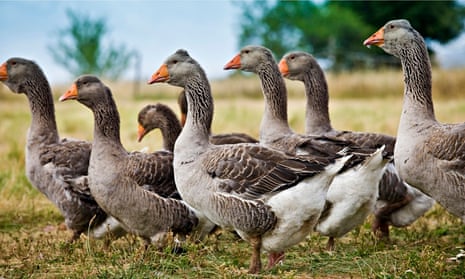A foie gras producer has appeared in court in France accused of “serious animal cruelty” in a case which campaigners are determined to turn into a trial not only of the individual company but of the controversial delicacy itself.
The Ernest Soulard producer, who supplied France’s multi-starred chef Joël Robuchon and Britain’s Gordon Ramsay, stands accused of cruelty for the conditions in which the company’s birds were kept.
But an animal rights association is attempting to turn the hearing into an indictment of ‘gavage’ – the injecting of food directly into the birds’ gut leading to the rapid enlargement of the liver.
The campaign association L214 accused the producer of cruelty after publishing a video of the conditions in which the company’s ducks were kept. The film showed exhausted and distressed birds in individual cages in which they could hardly move and appeared to be suffering from painful eye injuries and abscesses.
It is the first time a producer of foie gras, considered a French national delicacy, has gone on trial for cruelty, and L214 campaigners said the hearing would put the issue of gavage under the spotlight.
“It’s the first time gavage has gone on trial,” said L214, adding it would enable a “profound discussion of the legality or not of this practice and the consequences it can have on the animal.”
“The Ernest Soulard company was targeted because we had enough evidence to bring a legal case. If the company is convicted, it will obviously affect the practice of gavage which is banned in numerous countries,” Hélène Thouy, lawyer for L214 told AFP.
Before the hearing in La Roche-sur-Yon in the Vendée region, Roland Tonarelli, director general of Ernest Soulard said his company would vigorously contest the charges against them.
“Gavage is not on trial. The question is was there cruelty or not? We will show step by step, minute by minute that this is not the case. We have factual evidence to show that the video is a montage ... and not all of it was filmed at our plant.”
The foie gras producer is suing L214 for trespass and damage to its property.
“We are not barbarians ... the video has damaged (foie gras) producers and created a climate of suspicion,” added Tonarelli.
The farmers argue foie gras is part of France’s gastronomic tradition, itself listed by UNESCO as part of the world’s heritage.
The European Union banned individual cages for birds in 2011, but gave producers until the end of 2015 to install larger collective cages for the gavage.
Soulard also supplies some of France’s most celebrated restaurants including Alain Ducasse’s Jules Verne and Le Meurice, Le Georges V, and Fouquet’s.
“Our inquiry shows that there is only one way to produce foie gras and it comes at the cost of severe suffering to the animal,” L214, which has an ongoing ‘Stop Gavage’ campaign said in a statement.
“Even on the tables of the most prestigious restaurants, foie gras is nothing more than the diseased liver of a bird trapped in a cage, stuffed and sickened.”
If convicted of animal cruelty, the company could face a €30,000 fine and a prison sentence.
France produces 74 per cent of the world’s foie gras and has around 8,000 producers.

Comments (…)
Sign in or create your Guardian account to join the discussion